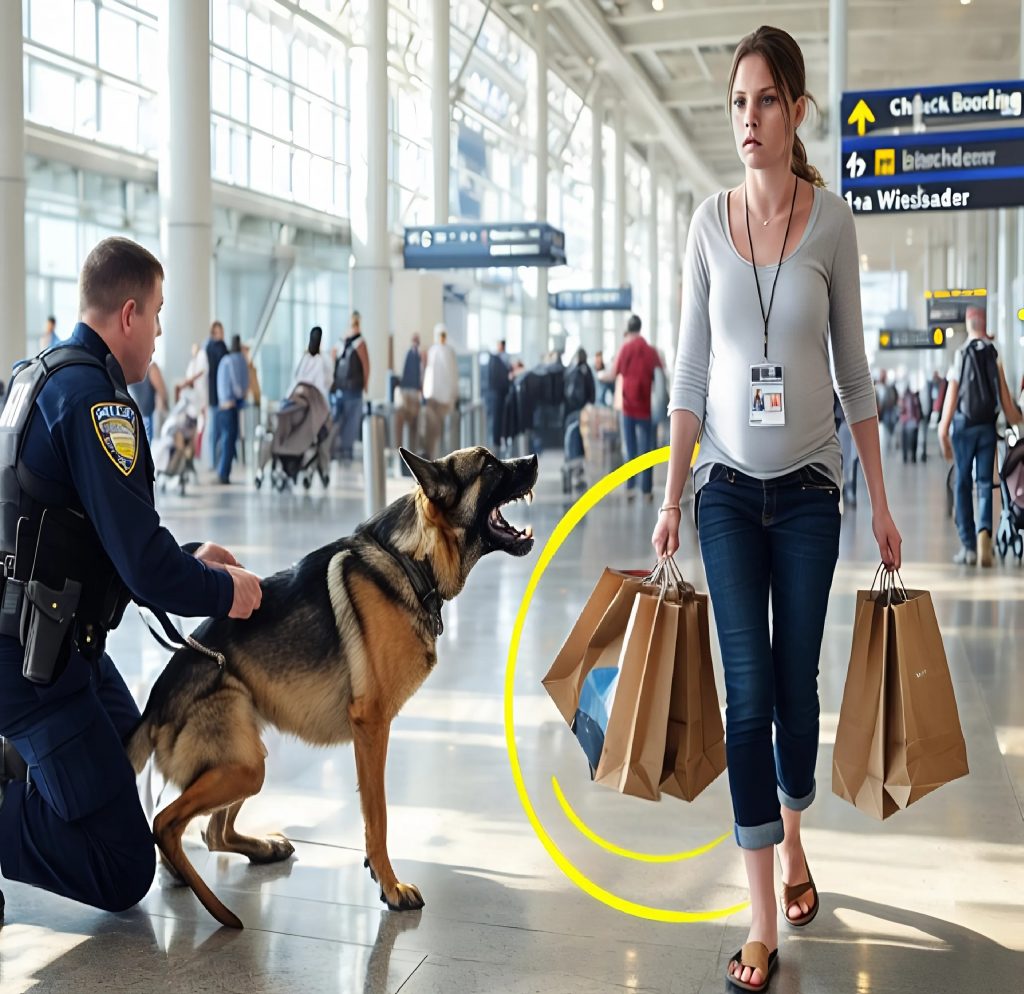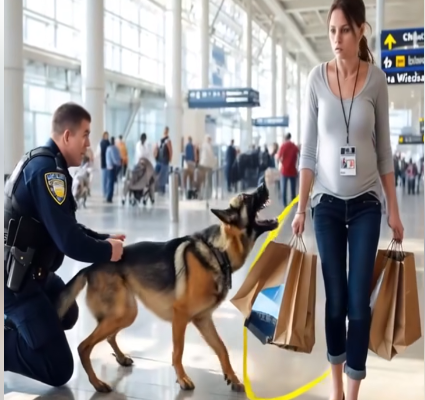At 9:15 a.m. on what seemed like an ordinary Tuesday, the international departures terminal at one of Europe’s busiest airports was buzzing with movement. Rolling suitcases, last-minute announcements over loudspeakers, tired families, business travelers sipping coffee. Among the uniformed personnel was a German Shepherd named Rex, a trained detection dog working with the airport’s narcotics unit. He was known for being calm, obedient, and remarkably accurate.

Rex had served for over four years. He didn’t bark for no reason. If he reacted, handlers paid attention.
And that morning, he did something no one expected.
As the security line shuffled forward, a woman in her late twenties appeared. She wore comfortable travel clothes, a puffy white jacket, and carried a small handbag. Her gait was slow, careful. She looked very pregnant. No one paid her much attention—until Rex suddenly stopped walking, his ears perked, and he began to growl.
Seconds later, the growl turned into loud, persistent barking. He lunged toward the woman, restrained only by the leash. Passengers gasped and stepped back. Some looked at the officers with concern. A dog barking at a seemingly vulnerable pregnant woman? It looked bad.
The woman herself froze. She clutched her stomach, her face pale and lips trembling.
“Call him off!” someone shouted.
But Rex wasn’t snarling. He wasn’t being aggressive. He was insistent, focused, and fixated entirely on the woman’s midsection.
His handler, Officer Kaminski, had worked with him for years. He recognized the behavior. Rex wasn’t reacting emotionally — he had sensed something.
Kaminski stepped forward and gently asked the woman to come with him for a secondary screening.
She resisted. Said she was late. Claimed a high-risk pregnancy. But as soon as the supervisor arrived and explained they were obligated to follow protocol when a trained dog flagged a passenger, she reluctantly followed them to the screening room.
That’s when everything changed.
In the privacy of the room, under trained female officers, her «pregnant belly» was examined. It wasn’t real. It was a silicone prosthetic, expertly crafted to resemble the size and texture of a third-trimester bump. Hidden inside was a tightly sealed container.
Inside that container? Over two kilograms of liquid narcotics — specifically, a synthetic opioid concentrate valued at over $2 million on the black market.
The woman was immediately arrested.
Further investigation revealed she was a part of an international smuggling ring. The prosthetic had been custom-designed. She had been coached to behave like a pregnant traveler: avoid eye contact, walk slowly, act tired. Her documents were forged, her medical certificate fake. She had been promised a payout of €20,000 if she made it through customs.
But she hadn’t accounted for Rex.

The operation had been flawless on paper. No scanner would have picked up the soft silicone. No metal detector would have triggered an alert. But Rex’s sense of smell — or possibly his detection of hormonal anomalies and chemical residues — caught what no machine could.
The story made national headlines within 48 hours.
“Service Dog Exposes Shocking Airport Smuggling Scheme”
“She Wasn’t Pregnant — She Was a Human Drug Container”
“Airport Dog Saves Lives with a Bark”
Rex became an overnight hero. Videos of his reaction circulated widely. He received an official commendation from the customs agency and a specialized service medal.
Social media was flooded with comments:
“Good boy? No. Best boy.”
“Machines missed it. The dog didn’t.”
“She put her own life at risk and countless others. Thank you, Rex.”
Later, forensic specialists confirmed that had the capsules ruptured inside her body, she would have died within minutes. Moreover, the airport could have become a passageway for a massive drug distribution channel.
When asked how Rex managed to detect something so well-hidden, Officer Kaminski simply said:
“Dogs trust what they smell, not what they see. We’d do well to listen to them more often.”
Rex still works at the airport. Calm, focused, and now a bit more famous. But for him, it’s just another day on duty. And for hundreds of passengers walking past him each morning, it’s just another quiet reminder that sometimes, a bark isn’t noise — it’s a warning we should never ignore.



